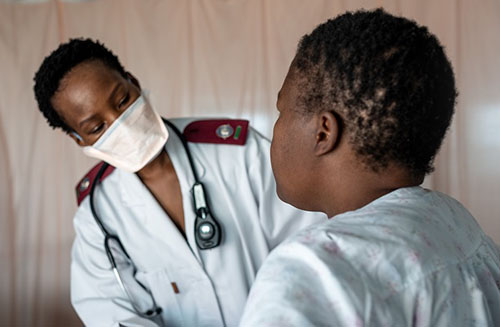by WorldTribune Staff, May 6, 2020
Coronavirus lockdown orders may lead to a worldwide rebound in tuberculosis infections, the effects of which could persist for years, new research showed.

Social distancing mandates and stay-at-home orders will make it impossible for health care workers to test vulnerable populations and for patients to access ongoing treatments for TB, the Stop TB Partnership reported on May 5.
“In spite of having drugs and treatment… we are not yet close to ending it and TB remains the biggest infectious disease killer,” said Lucica Ditiu, executive director of the Stop TB Partnership. “COVID has hit us very hard. The more people we have not diagnosed and treated the more problems we will have in the coming years.”
TB is a bacterial infection that normally attacks patients’ lungs. It is largely treatable yet still infects an estimated 10 million people every year.
The Stop TB Partnership’s research showed that the COVID-19 social distancing mandates could result in 1.4 million additional deaths from TB by 2025.
In 2018, TB killed around 1.5 million people, according to the World Health Organization, including more than 200,000 children.
Since effective medication exists, the world’s TB response is centered on testing and treating as many patients as possible. But widespread TB testing is not possible amid COVID-19 lockdowns, the researchers said.
“TB is actually curable with affordable drugs. So a lot of control efforts in recent decades have really been focused in diagnosing cases as quickly as possible,” said Nimalan Arinaminpathy, associate professor in mathematical epidemiology at Imperial.
“Lockdowns and other measures against coronavirus are affecting these systems for managing tuberculosis. In fact (in the models) it takes several years for this elevated TB burden to come down to pre-lockdown levels.”
Cheri Vincent, head of TB division at USAID, said several studies were looking into how TB puts an individual at higher risk of getting sick with COVID-19.
“As that information becomes available we may be looking at a much more dire situation,” she said.
Suvunand Sahu, deputy executive director of Stop TB Partnership, said there was significant concern over the millions of people living with the infection as COVID-19 spreads.
“We know that TB does create damage in the lungs, so when your lung capacity is limited adverse outcomes of COVID would naturally be expected to be higher,” he said.
Intelligence Brief __________ Replace The Media
